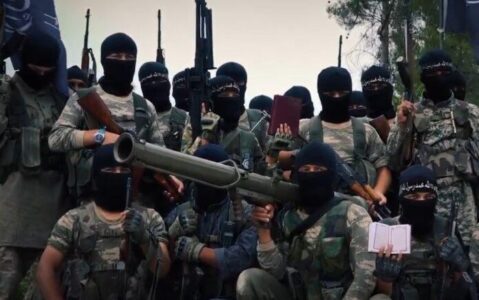
UN warns terrorist threat has increased and is more diffuse
The U.N. Security Council warned Thursday that the threat of terrorism has increased and become more diffuse in various regions of the world aided by new technologies.
It strongly condemned the flow of weapons, military equipment, drones and explosive devices to Islamic State and al-Qaida extremists and their affiliates.
The presidential statement, approved by all 15 council members, was adopted at the end of an open meeting on counterterrorism chaired by External Affairs Minister Subrahmanyam Jaishankar of India, who called terrorism “an existential threat to international peace and security.”
In the presidential statement, which is a step below a resolution, the Security Council expressed grave concern that terrorists are raising and transferring funds in a variety of ways, including abusing legitimate businesses and non-profit groups, kidnapping for ransom and trafficking in people, cultural items, drugs and weapons.
The council urged the 193 U.N. member states to prioritize countering terrorist financing.
It also esaid terrorist groups “craft distorted narratives that are based on the misinterpretation and misrepresentation of religion to justify violence” and use names, religion, or religious symbols for propaganda, recruitment and manipulation of followers. To tackle this, the council called for counter-narratives “promoting tolerance and coexistence.”
The statement said combatting terrorism requires governments and the “whole of society” to cooperate in increasing awareness about the threats of terrorism and violent extremism and “effectively tackling them.”
It said “strengthening cooperation in countering the use of new and emerging technologies for terrorist purposes” is needed, pointing to the increased use of the internet, social media, virtual assets, new financial instruments and the increasing global misuse of drones for terrorist attacks.
U.N. counterterrorism chief Vladimir Voronkov told the council in a virtual briefing that despite continuing leadership losses by al-Qaida and the Islamic State extremist group, “terrorism in general has become more prevalent and more geographically widespread, affecting the lives of millions worldwide.”
In recent years, he said, Islamic State, al-Qaida and their affiliates have exploited instability, fragility and conflict to pursue their agendas “particularly in West Africa and the Sahel, where the situation remains urgent as terrorist groups strive to expand their area of operations.” These groups have also contributed to deteriorating security in central and southern Africa, he said.
In Afghanistan, Voronkov said, “the sustained presence of terrorist groups continues to pose serious threats to the region and beyond.” He expressed concern that the country’s Taliban rulers “have failed to sever longstanding ties with terrorist groups sheltering in the country despite this council’s demands that they do so,” an apparent reference to al-Qaida-Taliban links.
He expressed concern at the rise in terrorist attacks “based on xenophobia, racism and other forms of intolerance or in the name of religion or belief.”
Voronkov, who heads the U.N. Office of Counterterrorism, also warned that terrorist groups use “online videogames and adjacent platforms to groom and recruit members, propagandize, communicate, and even train for terrorist acts.”
U.S. Undersecretary of State for Political Affairs Victoria Nuland told the council that “last year, the world faced more than 8,000 terrorist incidents, across 65 countries, killing more than 23,000 people.” She said the U.N. estimates that racially or ethnically motivated violent extremism has increased over 320% in recent years.
“Other recent attacks around the world — the bombing of a police station in Indonesia, the coup attempt in Germany, and hateful incidents here in our country — remind us that no country is safe from this threat, and it cannot be defeated by any of us alone or by any regional bloc,” she said. “We must all work together.”
Source: washingtonpost





